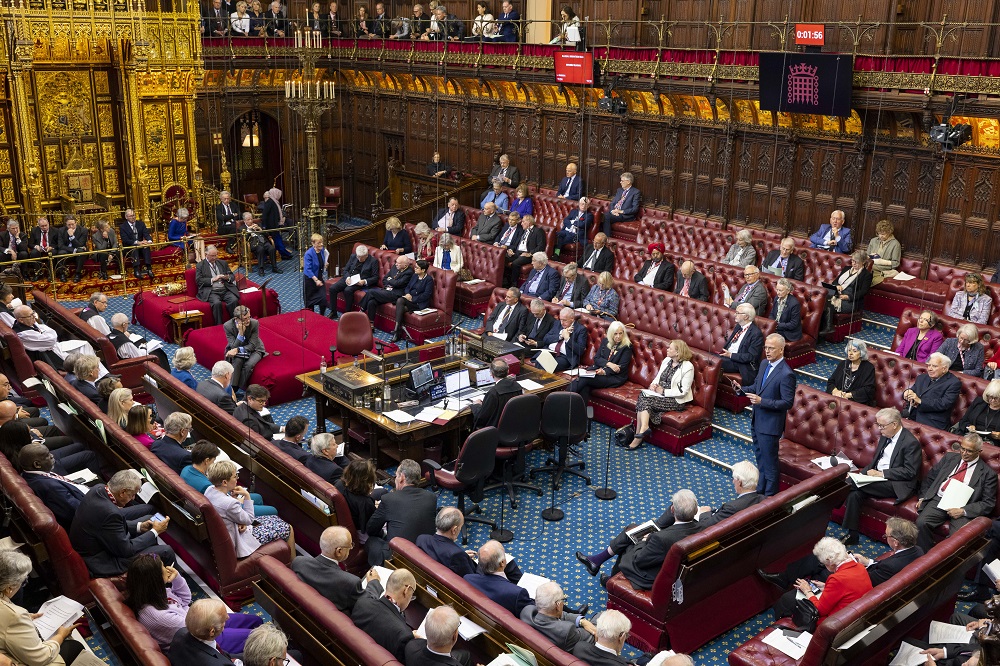Move to kick hereditary peers out of Lords progresses but faces bruising ride

Plans to boot hereditary peers out of the House of Lords have cleared their first hurdle in the upper chamber but face a bumpy ride.
The move to remove bloodline members faced sustained Tory criticism during a marathon debate at Westminster, which lasted more than eight hours and heard from more than 80 speakers.
Opponents levelled accusations of broken promises, class war, “guillotines” and “drive-by assassination”.
But leader of the Lords Baroness Smith of Basildon said reserving seats in Parliament for a select group of families could not continue.
Reform
The House of Lords (Hereditary Peers) Bill, which has already been through the Commons, will abolish the 92 seats reserved for members of the upper chamber who are there by right of birth.
There are currently 88 hereditary peers after the suspension of by-elections pending the legislation.
The Bill delivers on a promise in Labour’s election manifesto and has been promoted as the first step in a process of reform.
There have been concerns about the size of the House and calls to reduce its membership, which stands at around 800, compared with MPs, who are capped at 650 members.
But a commitment to introduce a participation requirement and mandatory retirement age of 80 were not included in the Government’s current legislative plans.
Claims
Under current rules, peers do not need to take part in proceedings to claim the daily attendance allowance of £361 and up to £100 for overnight stays plus travel expenses.
It has fuelled claims some use it as a glorified members’ club at taxpayers’ expense.
Responding to the Bill’s specially extended second reading debate, Lady Smith insisted there had been “no dodgy deals” to secure the passage of the legislation through the Lords and flatly rejected claims hundreds of Labour peers would be appointed to secure the ruling party an overall majority.
She said: “I can assure the House that is absolutely not the case at all.
“I think this House works best when there are roughly equal numbers between the Government party and the main opposition party.
“It is a sadness to me that during the last few prime ministers we have seen the explosion in what was then the (Tory) Government ranks – over a hundred more than the official (Labour) opposition.”
Commitment
On calls for the ousting of hereditary peers to only happen as part of a wholesale revamp of the unelected chamber, the Labour Cabinet minister said: “People say we can’t do anything unless you do everything, we don’t know what everything is and so we are going to do nothing. That is not a sustainable or acceptable position.”
Lady Smith added: “This Bill will deliver that first part of the manifesto commitment that takes the hereditary element away from the second chamber. It’s long overdue.
“In the 21st century, to reserve 10% of places in the House of Lords, part of our Parliament, just for those who are members of 726 families isn’t a position that can continue.”
“It’s a small reform. It is one that is necessary.”
She had pointed out at the start of the debate that even after the removal of the hereditary peers, the Conservatives would remain the largest party in the House.
Summing up for the official opposition, Tory shadow Cabinet Office minister Baroness Finn said: “The excepted hereditary peers are not relics of privilege, they are contributors who have enriched this House.”
She added: “We are not merely losing members with this Bill, we are losing wisdom, institutional memory and the dedication of those who continue to serve with distinction.
“These peers have much more to offer and their removal will diminish not enhance the effectiveness of this chamber.”
Lady Finn called for the remaining hereditary members “who wish to continue to serve” to be offered life peerages.
She said: “Such an approach would at the very least help assuage concerns many of us have about the Government’s motivations for presenting this Bill.”
Earlier, taking aim at the Tory opposition, Liberal Democrat leader in the Lords Lord Newby said: “The doctrine of ‘unright time’ is typically a cover for basic opposition to the proposal under debate and this is what’s happening with this Bill.”
The legislation received an unopposed second reading and now goes for detailed line-by-line scrutiny by peers.
Support our Nation today
For the price of a cup of coffee a month you can help us create an independent, not-for-profit, national news service for the people of Wales, by the people of Wales.






Kick, Boot, Bumpy, Hurdle and Bleed-Out@Today’s Language…drive-by assassinations…!
That Smuggy air must be full of the dead skin of ages past where they argued and debated the best ways to enslave the world, the dust cloud caused by the agitations of a great number of buttocks…
Cast your eyes around that hive of Feudalism and Privilege and the Corruption of politicians…
If the devil could cast his net he would have a good mixed catch of bottom feeders and sharks…
When the hereditary peers are abolished, that will be one nail in the coffin of the magic gametes method of appointment to high office.
Next stop the monarchy.